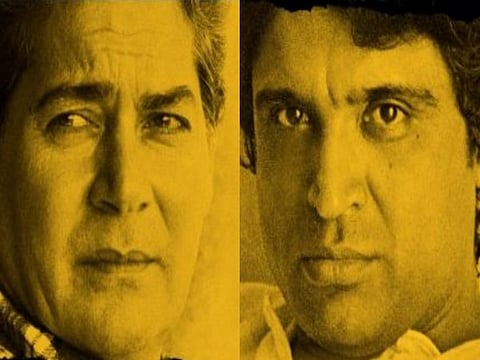

Somewhere along the second episode of the documentary series Angry Young Men, Javed Akhtar pulls out a book from his home library. A hardback with the title written in Urdu. Flipping to the last page, he says to his interviewers “Let me show you something to impress you.” It’s legendary poet Faiz Ahmed Faiz’s autograph. “Jaadu miyan ke liye, mohabbat se, Faiz. March ’84 (For Jaadu, with love, from Faiz. March ’84),” he says, smiling with an unserious pride. “Kya samajhte hain aap? (Did you guys think any less of me?)”
Nobody can ever think less of Javed Akhtar or Salim Khan. They themselves would be the last ones to do so. The brattish writer-duo entered Hindi cinema like a wrecking ball in the 70s. After comedies like Haathi Mere Saathi (1971) and Seeta Aur Geeta (1972), they came up with Zanjeer (1973) and kickstarted the dawn of the Angry Young Man, ripples of which are still seen today on the big screen. The Prime Video documentary on the veteran scriptwriters is helmed by seasoned film editor Namrata Rao in her directorial debut, with their next generation Farhan Akhtar, Zoya Akhtar and Salman Khan joining forces as producers. The outcome is a talking- heads-telling of two people, their life, their personalities and how they shaped and gave weight to the massy Bollywood film.
The documentary takes an inwards to outwards approach. We begin with the beginnings of the writers. How Salim Khan started off as an actor. “I thought of myself as James Dean,” he says. “Then Devdas released and I was confused. On some days I was James Dean, on others Devdas.” Akhtar, on the other hand, wanted to be an AD with “Guru Dutt or Raj Kapoor.” Akhtar and Khan got along after meeting on sets of the 1966 film Sarhadi Lutera and realised that writing was something they could do. Khan was on story and screenplay duties and Akhtar on dialogue. The result was characters and dialogues which became textbook for the commercial Hindi film. The anti-establishment, borderline atheistic protagonist, and lines like ‘Main aaj bhi feke hue paise nahi uthata (Even today I don’t pick up money thrown at me) became the essence of a new Bollywood. “They were not just dialogues, it was philosophy,” says Yash, who essayed a contemporary take on the Angry Young Man in the KGF films.
Both Khan and Akhtar tend to drop profound philosophies in between casual conversations. Unlike most writers, they are at ease facing the camera and aren’t unwilling to get personal. Akhtar, in an emotional sequence, opens up on his struggles. How he came to Mumbai in a third-class train compartment with no space to get a shut eye. How there were times when he didn’t have anything to eat (His wife Shabana Azmi also talks about the time when he hadn’t had a morsel of food for three days). “Deprivation of food and sleep can leave a deep impact on a person,” says Javed. “Now, when I go to five-star hotels I get breakfast in a trolley. Butter, jam, fried eggs, coffee…I still feel like it is not for me. It is somebody else’s.” His hands shake as he reigns in his emotions.
We also get a peep into the creative process of Khan and Akhtar. They aren’t afraid to admit that they did steal some ideas from the Westerns (The same-faced coin in Sholay wasn’t an original). How their personal struggles and anger with the system birthed the Angry Young Man. Cultural context is also provided on why the character, immortalised as Amitabh Bachchan’s Vijay, resonated with the collective conscience of a nation (“People wanted a hero who could get things done”). The documentary gives a comprehensive and wholesome view of two people and an era.
The line-up is also quite impressive. Apart from the writers’family, there are filmmakers like Karan Johar, Rajkummar Hirani and Shyam Benegal, giving insights into the phenomena of Salim-Javed. “I admired their ability to draw audiences and even, to some extent, envied them,” says Benegal. Film critic Anupama Chopra and trade analyst Komal Nahta are also roped in to explain how Salim-Javed had the numbers going for them (their strike rate was unparallelled, 22 hits out of 24 films they worked together on). The most interesting insights into these two men’s men comes from the women in their lives. Akhtar’s ex-wife Honey Irani’s anecdotes of him and their marriage gives a sweet touch and humanises the legend. She reminisces how he proposed to her during a rummy game on set. “His luck was bad that day and he asked me to pull a card. I did and he folded. He then asked my hand for marriage,” she says. “I should have known that gambling doesn’t pay,” she adds with a guffaw.
Angry Young Men benefits a lot from the intrigue around its subjects. Cinematically, it’s a straight documentary, with a lot of people coming in and commenting on the lives and films of Salim-Javed. If not experimental, it is still an enjoyable watch, full of trivia and nostalgia. The question of why they split up is dealt with honestly but it might not be satisfactory. Some things you know, some are discoveries. It’s ultimately all about these two star-writers, Salim and Javed, you could just hear them talk all day.
Directed by: Namrata Rao
Featuring: Salim Khan, Javed Akhtar, Salman Khan, Zoya Akhtar, Farhan Akhtar, Arbaaz Khan
Streaming on: Prime Video
Rating: 3.5/5